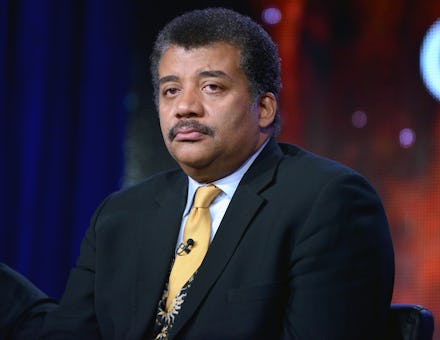What Makes America's Favorite Scientist Such an Anomaly

Many factors make Neil deGrasse Tyson unique – his ability to make complex ideas accessible, the fact that he hosts his own primetime TV show.
But he’s also a rare breed in the world of American science: a black astrophysicist. Considering the stark absence of African-Americans in STEM fields, his position is nearly as important from a racial standpoint as for what he’s accomplished professionally.
NPR’s Code Switch recently published an article on the subject, outlining the struggles Tyson faced during his formative years:
"There are very, very few African-American astrophysics PhDs," he said. "That's for a reason. I was doing something people of my skin color were not supposed to do.”
Perhaps unsurprisingly, he faced racism throughout his education, especially as a grad student at the University of Texas at Austin: "I was stopped and questioned seven times by University police on my way into the physics building," he explained. "Seven times. Zero times was I stopped going into the gym — and I went to the gym a lot. That says all you need to know about how welcome I felt at Texas."
Tyson maintains few illusions about the challenges facing black people in America, and the barriers that prevent blacks from entering the STEM fields in larger numbers. Of his ambition to become an astrophysicist, Tyson adds: “I got to see how the world around me reacted to my expressions of these ambitions. All I can say that is the fact that I wanted to be a scientist, an astrophysicist was, hands-down, the path of most resistance through the forces of society.”
Image Credit: Geek Tyrant
But the reasons for this phenomenon are harder to quantify. Jesse Washington proposes that “a complex equation of self-doubt, stereotypes, discouragement and economics” accounts for the low and falling numbers of blacks in science and mathematics. Numbers are down among other ethnic groups as well, but with blacks they are especially pronounced.
In 2009, black students received just 7% of all American STEM bachelor’s degrees, 4% of master’s degrees and 2% of PhDs, according to the National Center for Education Statistics. To break it down specifically, they accounted for 1% of science technologies PhDs and 2% of PhDs in the physical sciences.
As for the black scientists who do pursue such degrees, their experiences are often defined by “survival strategies” designed to compensate for their dwindling numbers. J.C. Holbrook conducted a qualitative study compiling interviews and personal accounts. She found that oftentimes black science students isolate themselves and self-medicate as coping mechanisms.
Even professional scientists feel like their blackness is often viewed as a deficit. When Grinnell College president Raynard S. Kingston published a paper about how similarly qualified black scientists receive less project funding that white scientists, the backlash was racially tinged. A rebuttal made the point to identify him as an “African-American” scientist, which he claims “seemed to … plant a small seed of doubt about either [his] integrity or [his] competence as a scientist.”
“Why am I an ‘African-American scientist’ while others are simply ‘scientists?’” he adds.
While these incidents aren’t completely unique to black science students, their frequency combined with the disproportionately slim numbers of blacks with STEM degrees make them that much more disconcerting. Neil deGrasse Tyson has overcome many odds to get where he is today. Hopefully he inspires more black youth to do the same.